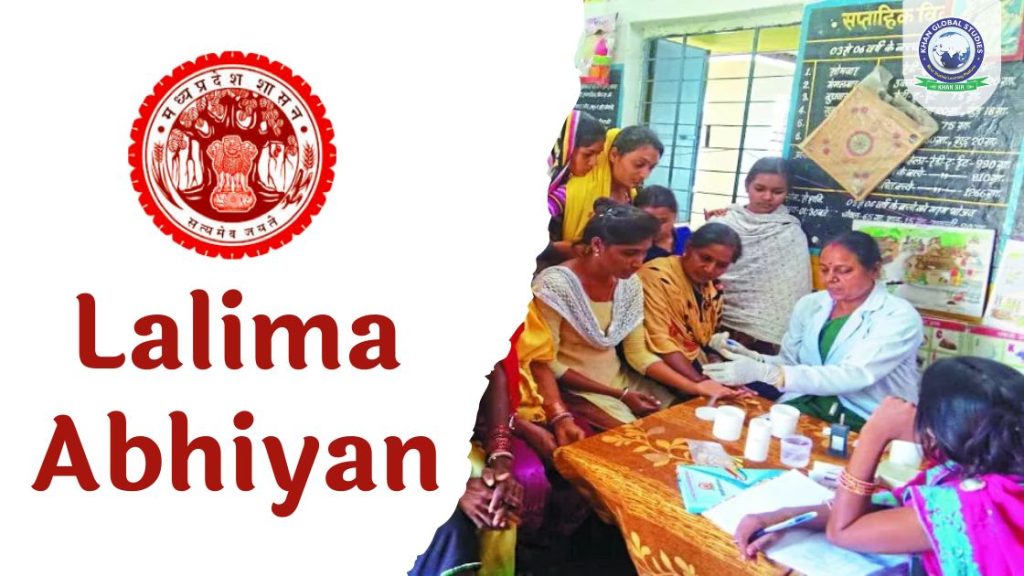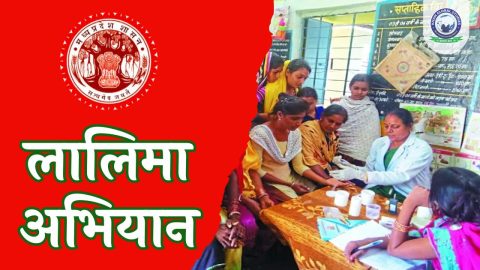Madhya Pradesh has launched a landmark health initiative called “Lalima Abhiyan” to tackle anaemia among women and children. The campaign aims to address the widespread anaemia problem by providing nutritional support and raising awareness about the importance of a balanced diet.
Launch of the Scheme
Lalima Abhiyan was launched on 1 November 2016. Its main objective is to improve the health of children, adolescent girls, pregnant women and women of reproductive age groups and prevents anemia.
History and Background
Lalima Abhiyan was launched to tackle the high rate of anaemia. The state government, recognising the serious health implications of anaemia, made this campaign a part of its comprehensive health improvement strategy. The inspiration for the campaign came from successful health interventions in other regions and the need for similar efforts in Madhya Pradesh.
Need for Lalima Abhiyan
Anemia, defined as a deficiency of red blood cells or haemoglobin, is a major health concern in Madhya Pradesh. It causes fatigue, weakness and various health complications, particularly affecting women and children. The high anaemia rate hinders the population’s overall development and well-being, making it necessary to address the issue through targeted interventions.
Goals and Objectives
The primary goal of the Lalima Abhiyan is to reduce rates of anemia and improve the overall health and well-being of the affected population. The campaign targets women of reproductive age, pregnant women, and children, as these groups are most vulnerable to anemia.
Key Features of the Campaign
- Awareness Programs: The Lalima Abhiyan includes extensive awareness programs to educate the public about anemia, its causes, and preventive measures. These programs are designed to reach a wide audience through various media channels.
- Nutritional Interventions: The campaign provides nutritional supplements, including iron and folic acid tablets, to people at risk of anemia. Additionally, efforts are made to promote a balanced diet rich in iron and other essential nutrients.
- Regular Health Checkups: Regular health checkups are conducted to monitor the hemoglobin levels of the target population. These checkups help in the early detection of anemia and timely intervention.
Beneficiaries of the scheme
may include: all school-going and out-of-school adolescent girls, pregnant and lactating women, children from 6 months to 10 years, and women in the reproductive age group of 19 to 49 years.
Application Process
There is no application process to avail the benefits of the scheme. The number of beneficiaries is determined through a survey and registration of Anganwadi centres.
Implementation Strategies
- Collaboration with Health Departments: The success of the Lalima Abhiyan depends on collaboration between state health departments and local health workers. This participation ensures smooth implementation and monitoring of the campaign.
- Community Participation: Community participation is crucial for the success of the campaign. Local leaders and volunteers play a key role in spreading awareness and encouraging participation in health programs.
- Monitoring and Evaluation: A robust monitoring and evaluation framework is in place to track the progress of the Lalima Abhiyan. Regular evaluations help identify gaps and make necessary adjustments in campaign strategies.
Role of Government and NGOs
- Government Initiative: The Government of Madhya Pradesh provides financial and logistical support for the Lalima Abhiyan. Various departments work together to ensure the success of the campaign.
- Contribution of NGOs: NGOs play a key role in the implementation of the Lalima Abhiyan. They assist in organizing communities, conducting awareness programs, and distributing nutritional supplements.
Educational Initiatives
- School Programs: Schools are an effective platform for educating children about the importance of nutrition and health. The Lalima Abhiyan includes programs that teach students about anemia and measures to prevent it.
- Community Workshops: Community workshops are held to educate women about anemia and the importance of a nutritious diet. These workshops provide practical tips and resources to improve their health.
Nutritional supplements
- Types of supplements provided: Iron and folic acid tablets are distributed to those at risk of anemia. These supplements are essential to increase hemoglobin levels and prevent anemia.
- Distribution methods: Supplements are distributed through health camps, schools, and community centres. This ensures that they reach the maximum number of beneficiaries.
Health camps and checkups
- Frequency and location: Health camps are regularly held in various locations, especially in rural and underprivileged areas. These camps provide essential health services including anemia checkups and treatment.
- Services Provided: Health camps include hemoglobin testing, nutritional supplement distribution, and health education. Medical professionals are available to provide counseling and treatment.
Awareness campaigns
- Media Involvement: Media has a vital role in spreading awareness about the Lalima campaign. Television, radio and social media are used to reach a wider audience and educate them about anemia prevention.
- Public Engagement: Public engagement such as health fairs and community meetings are organized to involve the community in the campaign. These events provide a platform to discuss health issues and solutions.
Challenges Faced
- Logistic Issues: Lalima Abhiyan faces logistical challenges such as supply and distribution of supplements in remote areas. Addressing these challenges is crucial for the success of the campaign.
- Cultural Barriers: Sometimes cultural beliefs and practices hinder the prevention and treatment of anaemia. Community education and awareness are important to overcome these barriers.
Future Prospects
- Expansion Plans: There are plans to expand Lalima Abhiyan in the future so that more population groups can benefit. More resources and support are being mobilised to expand the campaign to more areas.
- Long-Term Sustainability: Continuous efforts are being made to ensure the long-term sustainability of the campaign. This includes empowering local communities and health workers so that they can support the campaign in the future.
Conclusion
Lalima Abhiyan has contributed significantly to tackling the problem of anaemia in Madhya Pradesh. The campaign not only reduces anaemia rates but also improves the overall health and well-being of the affected population. Through this, the state government and partner organizations are determined to give a healthy and happy future to the weaker sections of society.
Frequently Asked Questions
Q: What is Lalima Abhiyan?
Answer: Lalima Abhiyan is a government initiative that aims to reduce the rate of anemia among women and children in Madhya Pradesh.
Q: How does it reduce anemia?
Answer: The campaign provides nutritional supplements, spreads awareness and conducts regular health checkups to detect and treat anemia early.
Q: Who can benefit from this campaign?
Answer: Women of reproductive age, pregnant women and children benefit the most from this campaign.
Q: What are the key features of Lalima Abhiyan?
Answer: Awareness programs, nutritional interventions, regular health checkups and community participation are the key features of Lalima Abhiyan.
Q: How can one join it?
Answer: One can join Lalima Abhiyan by participating in community workshops, taking services in health camps and spreading awareness about the campaign.





